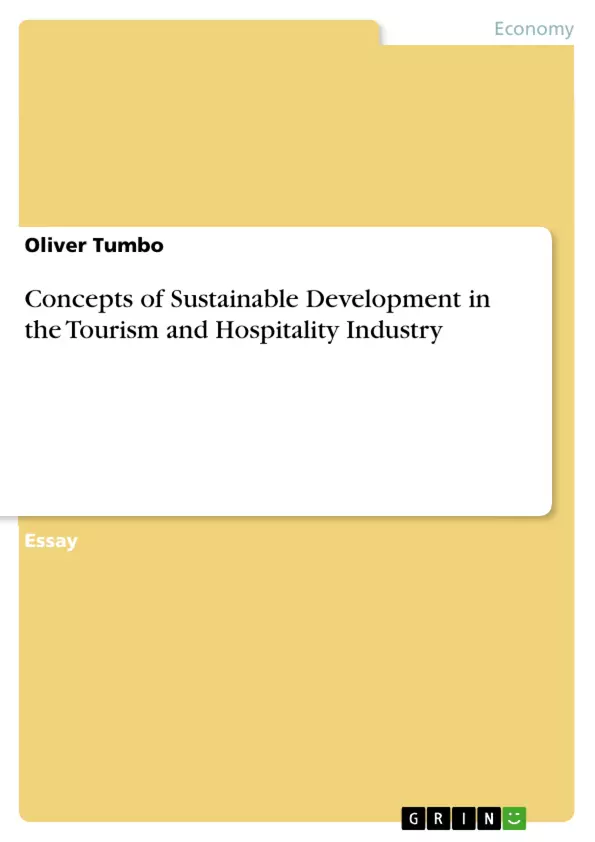Sustainable development can be explained as one that meets the needs of the present time without interfering on the future generations’ ability of to meet their own needs.
This translates to meeting the needs of a diverse people in current and future communities, promoting individual well-being, social harmony, and creating equal opportunities.
Therefore, sustainable development seeks to provide a sober approach for making better decisions on issues that affect people’s lives.
This paper unravels some of the key concepts of sustainable development in the tourism and hospitality industry.
This is informed by the fact that our societal decisions have real consequences on the lives of the people.
Table of Contents
- Introduction
- The Concepts of Sustainable Development
- Key Sustainable Issues and Trends
- Economic
- Ecology
- Social Issues
- Policies for Enhancing Sustainability and Competitiveness in the Tourism and Hospitality Industry
- Reducing the Industries' Carbon Footprint
- Consumer Demand for Sustainable Practices
- Marketing the Tourism Industry's Environmental Credentials Sustainable
- Developing Partnerships and Frameworks
- Assisting the Tourism Industry to Adapt to Climate Change
- Arguments against Sustainable Development
Objectives and Key Themes
This text aims to explore the concept of sustainable development within the tourism and hospitality industry. It examines the key issues and trends related to economic, ecological, and social sustainability, and explores potential strategies for enhancing sustainability and competitiveness within the industry.
- Defining and explaining the concept of sustainable development.
- Analyzing the economic, ecological, and social dimensions of sustainable development in tourism and hospitality.
- Exploring strategies for promoting sustainable practices within the industry.
- Examining the challenges and arguments against sustainable development in this sector.
- Assessing the role of consumer demand and industry partnerships in achieving sustainability.
Chapter Summaries
Introduction: This introductory chapter defines sustainable development as meeting present needs without compromising future generations' ability to meet their own. It highlights the interconnectedness of environmental, social, and economic factors, emphasizing that sustainable development requires a systems-thinking approach that considers both spatial and temporal dimensions. The chapter establishes the broad scope of sustainable development, extending beyond environmental concerns to encompass social justice, equity, and the well-being of diverse communities.
The Concepts of Sustainable Development: This chapter further elaborates on the core concept of sustainable development, emphasizing its dual dependence on environmental and societal factors. It underscores the inherent interconnectedness between human societies and the environment, highlighting the need for responsible resource management and consumption patterns to ensure the well-being of both present and future generations. The chapter lays a foundational understanding of the principles that underpin sustainable development practices.
Key Sustainable Issues and Trends: This chapter delves into the three primary dimensions of sustainable development: economic, ecological, and social. The economic aspect focuses on capital convertibility, equitable distribution among generations, and the need to maximize benefits while preserving resources for future use. The ecological dimension stresses the importance of biodiversity preservation and responsible resource management, highlighting the interconnectedness of ecosystems and the need for a holistic approach to environmental sustainability. Finally, the social aspect explores the interconnection between development and social norms, aiming to maintain healthy and resilient social systems capable of withstanding shocks.
Keywords
Sustainable development, tourism, hospitality, economic sustainability, ecological sustainability, social sustainability, environmental conservation, resource management, consumer demand, industry partnerships, climate change adaptation, generational equity.
Frequently Asked Questions: A Comprehensive Language Preview of Sustainable Development in Tourism and Hospitality
What is the overall purpose of this text?
This text explores the concept of sustainable development within the tourism and hospitality industry. It examines key economic, ecological, and social issues and trends, and investigates strategies for enhancing sustainability and competitiveness.
What topics are covered in the Table of Contents?
The Table of Contents includes an introduction, a detailed explanation of sustainable development concepts, key sustainable issues and trends (economic, ecological, and social), policies for enhancing sustainability and competitiveness, reducing the industry's carbon footprint, consumer demand for sustainable practices, marketing environmental credentials, developing partnerships, adapting to climate change, and arguments against sustainable development.
What are the main objectives and key themes?
The text aims to define and explain sustainable development, analyze its economic, ecological, and social dimensions in tourism and hospitality, explore strategies for promoting sustainable practices, examine challenges and arguments against it, and assess the role of consumer demand and industry partnerships in achieving sustainability.
What are the key themes explored in each chapter?
The Introduction defines sustainable development and highlights the interconnectedness of environmental, social, and economic factors. The Concepts of Sustainable Development elaborates on the core concept, emphasizing its dependence on environmental and societal factors. Key Sustainable Issues and Trends delves into the economic, ecological, and social dimensions of sustainable development within the tourism and hospitality sector. Subsequent chapters cover specific strategies and challenges related to achieving sustainability within the industry.
What are the key words associated with this text?
Key words include: Sustainable development, tourism, hospitality, economic sustainability, ecological sustainability, social sustainability, environmental conservation, resource management, consumer demand, industry partnerships, climate change adaptation, and generational equity.
What is the target audience for this text?
While not explicitly stated, the comprehensive nature and academic approach suggest the target audience is likely students, researchers, or professionals in the tourism and hospitality industry interested in learning about sustainable development practices.
Where can I find more information on sustainable tourism and hospitality?
This question cannot be answered within the context of the provided text. Further research using the keywords provided would be necessary.
- Citar trabajo
- Oliver Tumbo (Autor), 2014, Concepts of Sustainable Development in the Tourism and Hospitality Industry, Múnich, GRIN Verlag, https://www.grin.com/document/294584



